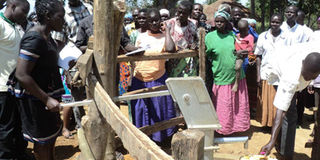Locals pay Shs1,000 to maintain water source

Relieved. Residents of Agwata Sub-county in Dokolo District officially receive a borehole constructed by Green Resources, a private organisation, last Thursday. PHOTO BY ISAAC OTWII
What you need to know:
- Coverage. According to statistics from the Ministry of Water and Environment, the country currently has 65 per cent access to safe water in rural areas and 77 per cent in urban areas.
- Challenge. Although open and spring wells, boreholes, tanks and piped water taps are the main sources through which government has extended safe water throughout the country, rivers and lakes are still the source in some remote areas.
- The safety of water across all sources is, however, not guaranteed as it is sometimes compromised by different structural factors during transit despite the different treatment methods accorded to it, according to experts and suppliers.
Scarcity of clean water has pushed residents of Agwata Sub-county in Dokolo District to appoint a 15-member committee to protect a recently constructed borehole that serves a population of about 5,000.
The residents mandated the committee chaired by Mr Peter Okullo to collect Shs1,000 every month from each household to protect the only clean water source in the area.
The borehole was constructed by Green Resources, a forest development and wood processing company, at a cost of Shs21m.
“We are trying to ensure that the communities around Agwata forest receive better services. That is why we have constructed two boreholes in Agwata and Adok Sub-counties,” said Ms Miriam Oweta, the Green Resources community relations officer.
The committee has already started collecting the money without resistance. Residents argue that they often trek long distances to the nearest water source and that the boreholes is a big relief.
Ms Joyce Aguti, a 52-year-old resident of Tetugu village, says she has been trekking 4km every day in search of water.
“In this area, we had only one protected well for the three villages. I am relieved I will not have to walk that distance again to get clean water,” says Ms Aguti.
Mr Patrick Ogwal, the Lwala Village chairperson, says the borehole will help the residents, especially women to concentrate on other activities, adding that collecting water has been consuming more than half of the time for their daily activities.
According to the Water Uganda Index 2018, the district has 726 domestic water points and two piped water schemes, which serve 176,243 residents, 160,207 of whom are in rural areas. However, of the 726 water points, 129 water points broke down and were abandoned five years ago.
The district vice chairman, Mr Nam Francis Ogwal, commends the forest company for providing clean water to the residents, saying the district does not allocate enough funds for drilling boreholes.
“The money the district gets from the central government to provide clean water is not enough. This financial year, the district can only drill six boreholes in the whole district,” he says.
Mr Ogwal urges the elected water user committee not to misappropriate the money they are to collect but use it to carryout periodic maintenance of the borehole.
“When the community loses trust in you, it will be hard to protect the water source but when protected, the borehole can serve the community for quite a long time,” he adds.




